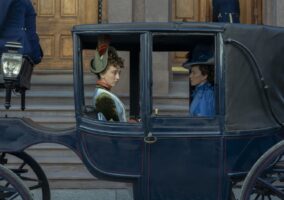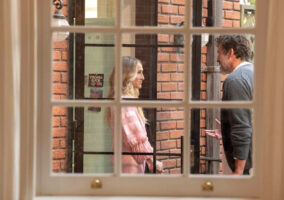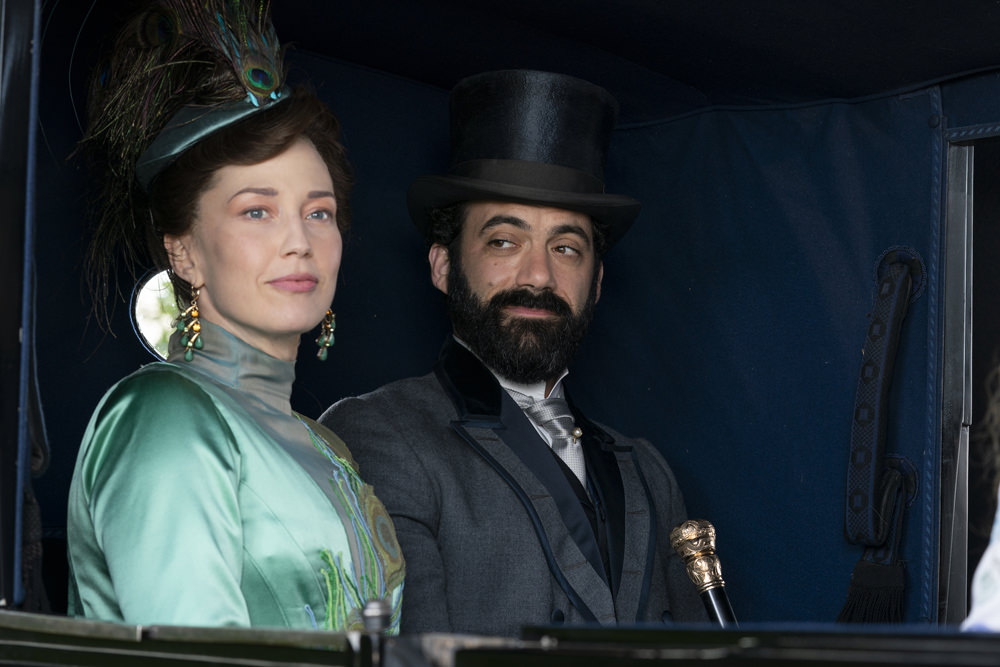
Servants with secrets! Uninvited guests for tea! A charity bazaar that turns into a social massacre! One of the things Julian Fellowes really excelled at during the height of the Downton Abbey years was his ability to turn absolutely no-stakes conflicts and problems into the most epic showdowns or conundrums you could possibly imagine. It seems he and his co-writer Sonja Warfield are still up to the task with The Gilded Age because there wasn’t one thing that truly mattered during this entire second episode and yet we were enthralled the entire time. Can we talk about that outrageously melodramatic title sequence? They could have just hired a chorus to sing the word “MONEY” over and over again and it would have had largely the same effect. Anyway, let’s dive in, shall we?
The cook at the Van Rijn house, whose name is Mrs. Bauer but who we dubbed Mrs. Notmore the moment we laid eyes on her, has a secret as all servants must in this world. We know she has a secret because Julian Fellowes’ favorite form of ruffian, The Man in the Derby, is threatening her in full view of the entire street and telling her he wants his money. That this was going on without Agnes or Bannister the butler having a clue of it doesn’t speak well of either of their ability to run a household, but whatever. The kitchen maid whose name we haven’t learned yet finds Mrs. Notmore crying over the radishes, as one does when one has a secret. Later, Mrs. Notmore steals some silver from right under Bannister’s nose but the Derby won’t have it because he’s more of a gold man, evidently.
Marion is off having even more dresses made for her at her Aunt Agnes’ expense and asks with no small amount of glee, “Who am I to object?” It’s early days yet, but we suspect Marion will be equal parts sympathetic and annoying, like a lot of Fellowes heroines. She likes living the wealthy life a bit more than she seems willing to admit, even as she spends most of her time complaining about her aunts and making strident comments about the poor. Anyway, her cute Philly lawyer friend Mr. Raikes is coming for a visit and she seems a little ambivalent about him. Peggy, on the other hand, would like to meet him to discuss…her secrets. As she notes to Marion, “Any colored lawyer would find his way back to my father and he can’t know about it.” “It” being her secrets, of course. It’s notable that Peggy is evidently part of the Black Elite of New York society, with a couple of extremely well-connected parents. It would seem she’s running away from her birthright in order to establish herself while Marion is embracing her birthright because she feels she has no other options (and also because she secretly loves it).
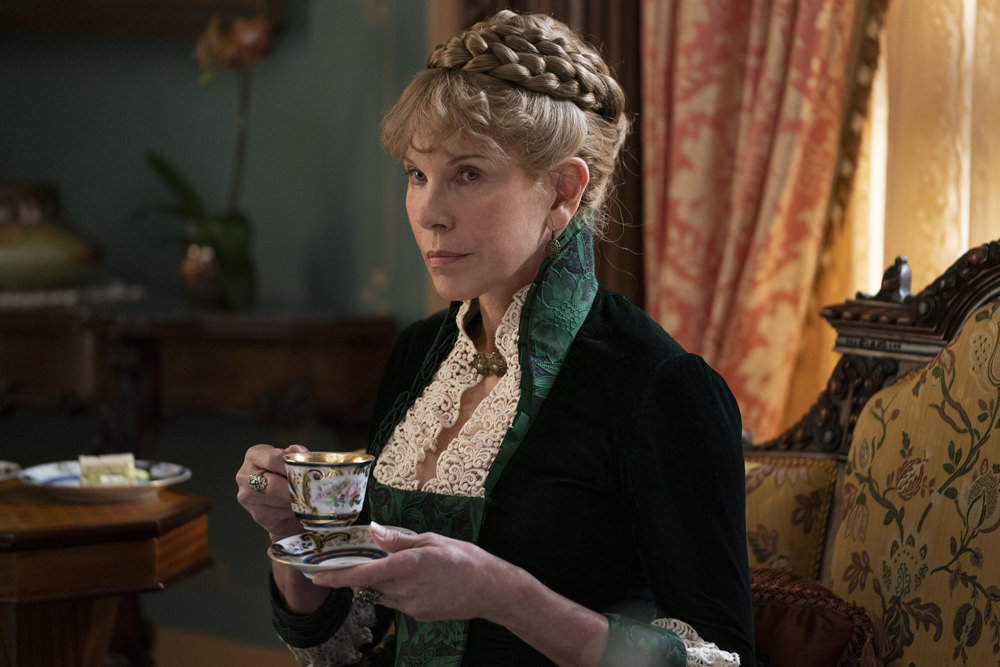
Mr. Raikes comes for tea, which Agnes insists on because “You can’t be indebted to these people” after he waived his fee for her. Agnes was a Dowager-level spewer of insults this episode, but we’ll get to that in a second. Larry Russell gets himself invited to tea by Oscar and it strikes us that he’s far better at navigating this world than anyone else in his social-climbing family. Not that Agnes was happy to see him there, of course. You know who was happy to see him there? Marion, who can barely raise more than a polite smile for Mr. Raikes, who’s puppy-dogging all over her. He agrees to meet with Peggy in the park. “I wish I could convince you I mean to be your friend,” he says to a polite Marion. We wouldn’t necessarily credit her with the best instincts, but he sort of does have a bit of a fortune hunter vibe to him. Later, they meet in the park and he spews a lot of tourist guidebook stuff at her before meeting with Peggy to discuss her secrets. We can’t get a read on him, but Agnes seems to think he’s no good. Then again, she seems to think that about practically everyone who doesn’t live in her house. “Do people like that bring their daughters out? I thought they just sold them to the highest bidder,” she sneers at the mention of Gladys Russell’s name. When Ada protests that she can’t possibly be opposed to a young girl, Agnes responds loftily, “I am opposed to her tribe.” Later, she announces to the room, “I am struggling to hold back the tide of vulgarians that threatens to engulf us! I feel like King Canute!” The Dowager Countess of Grantham couldn’t have said it better.
Of course, like the Dowager, Agnes has a kind and practical side. She may be a snob, but she’s not a racist – at least not on the surface. She embraces Peggy as a member of her household well before she’d ever let Mrs. Russell walk in her front door. Later, when she and Ada clash over her harshness regarding Marion, she makes it clear that she really does want what’s best for her and is coming from the direction of someone who evidently had to pay a high price for her security. She tells Ada she want Marion to marry for “security, support, and god willing, affection” rather than marry for money (but really she wants her to marry for money). She doesn’t trust Mr. Raikes and we suspect she will be proven right in some way about him.
Downstairs at the Russell house, Mrs. Bruce the housekeeper and Monsieur Baudin the chef are striking up a little flirtation. Meanwhile, Mrs. Russell’s ambitious and sharp-tongued ladies maid Turner makes a play for George, who does not seem amused by the effort. We can’t blame her. That beard is hypnotic. Upstairs at the Russell house, Gladys is not allowed to move more than two feet at a time and is forbidden from breathing any air in the same room as a man. She spends her days dressed like Little Bo Peep and pining after the gay man across the street.
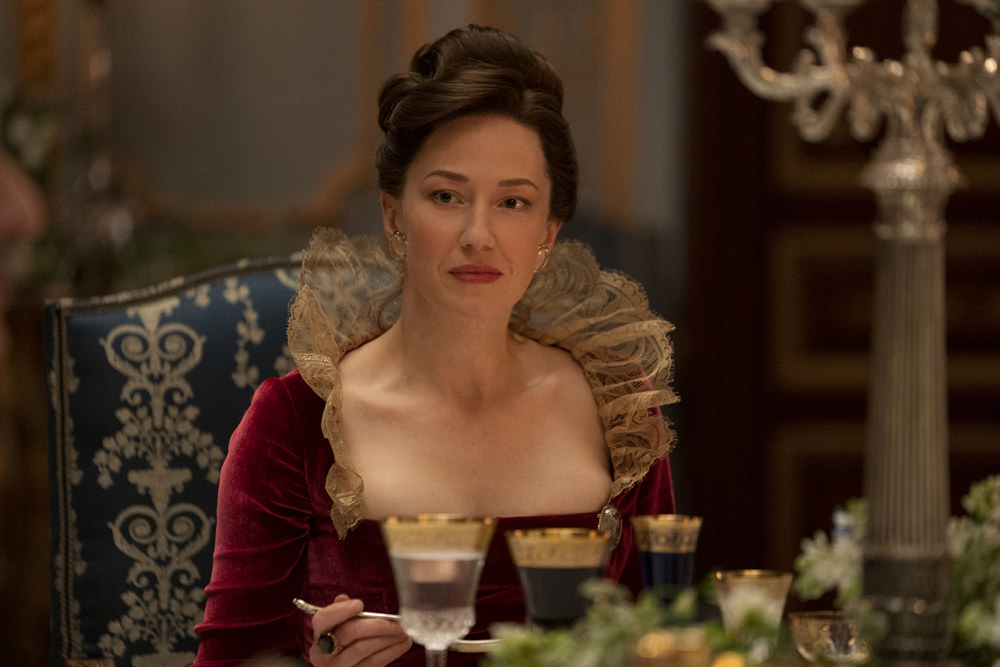
George gets Bertha to invite Mr. and Mrs. Morris to dinner to discuss his evil money-making plans. Bertha doesn’t think they’ll accept, but George figures (perhaps rightly) that his money and power will get them into society quicker than his wife’s machinations. “George Russell is a force in this city, whatever you like to pretend,” Patrick Morris tells his pouting wife. She worries what Mrs. Astor will think and Patrick responds that she “knows how the world works.” They can all hide behind ideas of taste and class, but in the end, they all love money way too much to keep the arrivistes out forever. Ann Morris is a classic Queen Bee and a big ol’ Mean Girl, who can’t see that she’s being outmaneuvered and overpowered. “Should we kneel?” she asks sarcastically when Bertha sweeps down her outrageously grand staircase to receive them. Dinner with her is a series of passive-aggressive remarks about Mrs. Russell’s décor and the extravagance of hiring a French chef. Bertha gets a few jabs in herself, although we can’t tell if her calling the Morris name “common” was one of them or just meant as an example of her own social cluelessness. She offers the use of her ridiculous ballroom for the charity bazaar, to which Mrs. Morris replies with a hilariously noncommittal “I almost wish we would.”
Meanwhile, George and Mr. Morris are playing pool and sizing each other up. George has some sort of railway scheme and he needs Morris and his fellow alderman to something-something so that they can all get rich when he something-something. We confess, it seemed a little vague. On the other hand, we were probably paying too much attention to his beard to keep track of what was being said. We know it was corrupt af, but he just looked so scorching hot doing …whatever it was. Later, Mr. Morris tries to convince Mrs. Morris to take Bertha up on her offer when the plans for the bazaar fell through, but she insists that Aurora Fane wouldn’t have it. He’s upset and predicts that things could go badly for them if they piss off George Russell. Anne, ever the mean girl, all but rolls her eyes at the idea that George could have any effect on her life. Bertha is in bed with her breakfast tray when she reads about the plans to hold the bazaar at a hotel. She throws her tray across the room in rage and it’s at this point we scrawled “CORA WOULD NEVER” in our notes. These are not the genteel aristocrats of Downton, after all. These are robber barons, found in the historical record under the listing “People You Do Not Fuck With.”
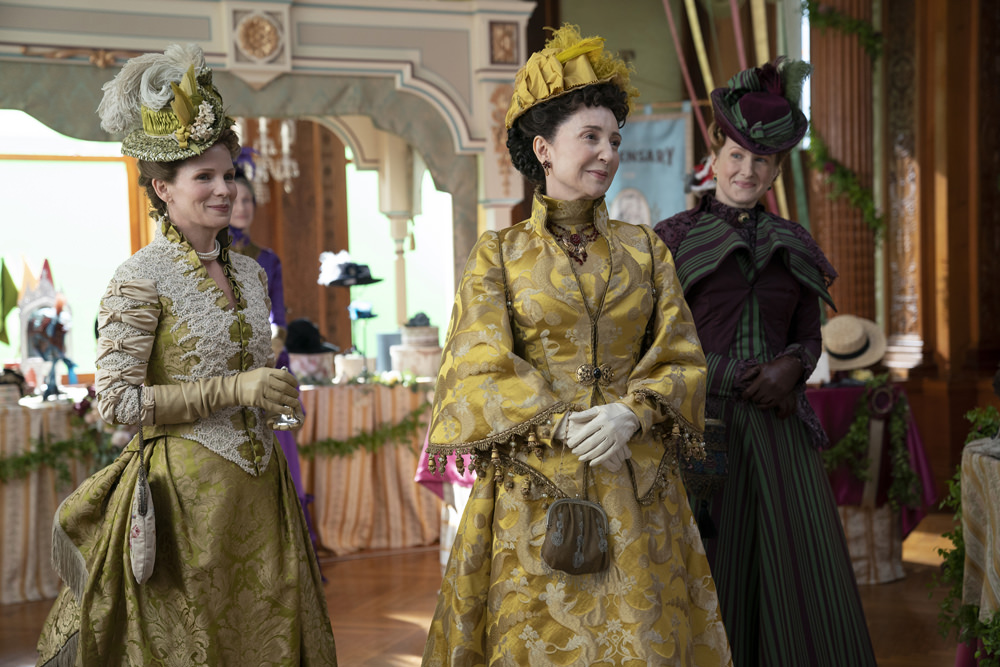
Meanwhile, Marion and Peggy find out that Mrs. Notmore has a fifty dollar gambling debt and they scheme to pay it off for her for reasons that aren’t quite laid out, given that these people all barely know each other. We suppose the point is to show how good the upper classes can be, which was a common theme on Downton. Marion goes to Oscar, who agrees to give her the money in exchange for a setup with Gladys, but Ada intervenes and pays off the debt herself. Marion tells her she loves her. Everyone is just so darn good in this house. Except for Mrs. Notmore. Oh and that vaguely racist maid who keeps harassing Peggy.
The society ladies all meet to discuss plans for the bazaar and Marion gets all plucky and preachy about how they’re treating Mrs. Russell. “Careful my dear, or I’ll report you to Aunt Agnes,” Aurora Fane scolds her in that I’m-joking-but-not-really way. The “Seriously, girl. SHUT. UP” was implied. “We still want her check, though,” Marion continues pluckily. “We just mean to insult her first.” As was the case with Downton Abbey, in order to enjoy this story, you’re going to have to root for people who existed in a terribly exploitive and historically terrible social and class system in which positively obscene amounts of money was spent on indulgences and comforts. In other words, it’s high society snobs vs. unethical businessman and Fellowes and Warfield are so good at threading that needle that you can’t quite figure out what side you want to come down on, even when you know you really don’t want any of them to win. It’s at this point when it’s best to just sit back and look at some dresses. This would be another thing Fellowes knows how to deploy instinctively because the charity bazaar scene was practically a candy story of late Victorian high fashion, all feathers and hats and fringe and eye-searing colors. (Catch our interview with The Gilded Age costume designer Kasia Walicka-Maimone)
Interestingly, Aurora Fane tells Marion that Anne Morris was the one to shoot down the idea of accepting Mrs. Russell’s offer, claiming she said “we would have been indebted.” We’re inclined to believe her, just because Ann was such a Head Cheerleader to Bertha all episode, but then Mrs. Astor showed up and Aurora practically wept on her hem. “Isn’t she a marvel. A queen among her people! You are so good and so kind!” Tone it down, Gretchen Wieners. Meanwhile, the scandalously mysterious Mrs. Chamberlain sashays over to Marion’s hankie stall in an absolute stunner of a dress. She’s well aware that she’s persona non grata among this set, but she and Marion have a polite and respectful exchange. She invites Marion to call on her, but admits that she probably won’t. Marion is always looking for ways to piss off her aunts, so she’ll probably be in her front parlor with muffins at eight the next morning. Anyway, Agnes rushes over and hisses that Mrs. Chamberlain’s money is tainted. Marion makes some snide and preachy remark about poor people in response.
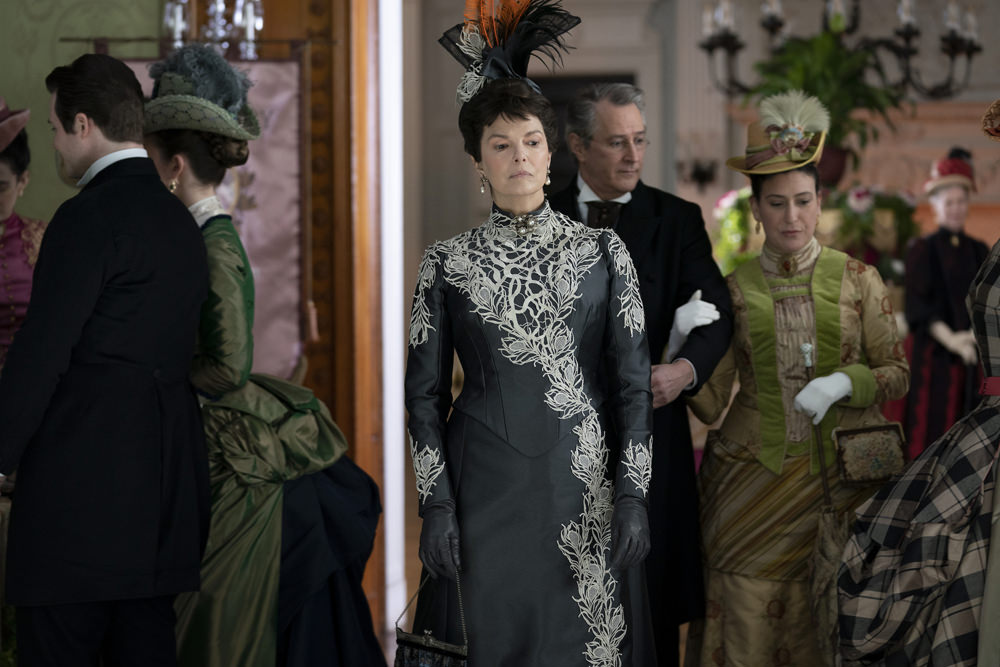
The Russells show up and Agnes bellows something about criminals and the gutter before harrumphing away. Oscar makes a beeline for Gladys, but Bertha gives him a reception so cool, you could practically see her breath. “We should get to know each other,” Oscar eagerly offers. “Maybe,” she replies, as she practically ice-skates away from him. Despite Agnes’ constant predictions that the Russells want to barge in her front door, Bertha seems largely disinterested in the house across the road. They’re not big enough fish for her. We wonder how long it will take Agnes to realize this and whether she’ll be angry when she figures it out.
George confronts Mrs. Morris and Mrs. Fane loudly about their refusal to take up his wife’s offer. Then he waved his big stick around and shut the whole event down in five minutes. He has something Bertha doesn’t in this battle with high society: the money and the right to spend it any way he wants. He knows that’s more power than any social caste or clique can wield and he also knows it’s the only real power these people understand. Ann Morris tries to tell a delighted Bertha that this stunt won’t impress the people she’s trying to impress, to which Bertha smugly replies,”Mrs. Morris, this sort of stunt impresses everyone.” She’s right. Even Mrs. Astor is impressed. “The lion has roared,” she notes. She later says he’s someone to be reckoned with, if not necessarily befriended. As Patrick Morris rightly observed to his wife, Mrs. Astor knows how the world works. This round goes to the New Money barbarians.
[Photo Credit: Alison Cohen Rosa/HBO]
Rachel Brosnahan Promotes “The Marvelous Mrs. Maisel” in Magda Butrym Next Post:
Vivienne Westwood Spring 2022 Bridal Couture Collection
Please review our Community Guidelines before posting a comment. Thank you!

